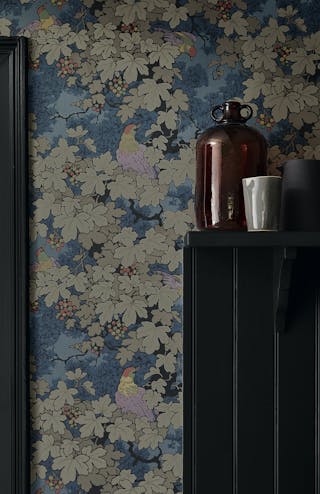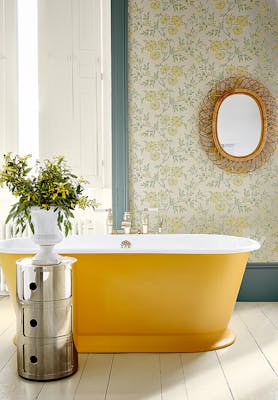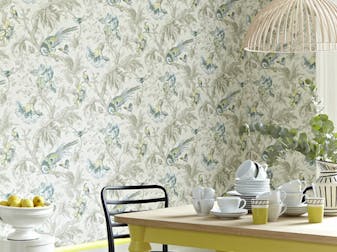
Archive Trails I
Traditionally, the scenes depicted in early 18th Century interiors were painted by hand; in effect, bespoke murals. This artisan form of decoration was the precursor to the tighter, more structured designs we have come to understand and appreciate as conventional wallpaper over the last two Centuries.
China Rose
China Rose (c1885) is a classic flamboyant floral, taken from a late 19th Century French hand-painted ‘Peking Stripe’ fabric with a distinct Chinese influence. The distressed opaque colours in the leaves and petals portray the hand of the original artist, in contrast with a judicious modern-day use of mica and metallic inks as witnessed in some colourways.
Darwin
Darwin (c1760) represents one of the Whitworth Art Gallery’s most important recent acquisitions and, with a twist in its story, this exemplary English piece was actually found intact in a house in Aix-en- Provence, France. The exotic scene accurately imitates a typical 18th Century hand-painted Chinese paper, but the tax stamp, still visible on the back of the original rag paper, categorically identifies it as English in origin. The colours interpreted in the ‘Serein’ colourway are very true to the original - a surprisingly (and wonderfully) well-preserved archive document.
Gustav
Gustav (c1875) was found in poor condition, making it somewhat difficult to date accurately, but archivists estimate it as mid-late 18th Century. Found in Eagle House, a Jacobean manor in Wimbledon, it bears the hallmarks of a classic block print, but in fact some of the flowers on the original were painted by hand and applied over the pre-printed trail as part of a decorative border. The scale of the pattern is reminiscent of a large damask design, but the muted colourways adapted for ‘Archive Trails’ mean this paper can be used all-over, without overpowering a room.
Paradise
Paradise (c1940) celebrates a truly rich mix of styles. The document from which this paper is drawn is actually a 20th Century piece, but the subject – exotic flora and the familiar oriental ho-ho birds - is classic ancient Chinoiserie, whilst the colouration in the original is very much in the style of a 19th Century French paper. This design retains the original’s oversized repeat and has been reproduced in six stunning colourways.
Sakura
Sakura (c1936) is a pretty trail of matt leaves and delicate blossom originating in France. The surface detail has been retained, contributing to its charming layered depth, whilst the colouration has retained an elegant, seductive informality. A mica ground has been used on some colourways to exaggerate the interplay of light and contrast on the surface of the paper.
Stitch
Stitch (c1940) is inspired by embroidered chintz cottons. The use of stippling (dot-work) was popular in embroidery and printing, particularly at a time when block printing was seen as an indication of status. In the late 19th and well into the 20th Century, ornate patterns in the home were a conspicuous symbol of wealth and associated with prosperity. The use of two print colours makes this paper especially easy to coordinate with paint colours and other elements in the room.
Vine
Vine (c1932), taken from the archive at the Whitworth Art Gallery in Manchester, offers an unmistakeable nod to William Morris, the father of the late 19th Century Arts & Crafts movement. An authentic surface print technique has been employed to reproduce this contemporary version, with the blue colourway being very close to the original in colour – despite the poor condition of the background colour on the surviving fragment.
Highland - Stitch

Trailing florals have been the subject of decorative pattern since long before the mechanisation ofOrder your free wallpaper samples today

Period Wallpapers

































